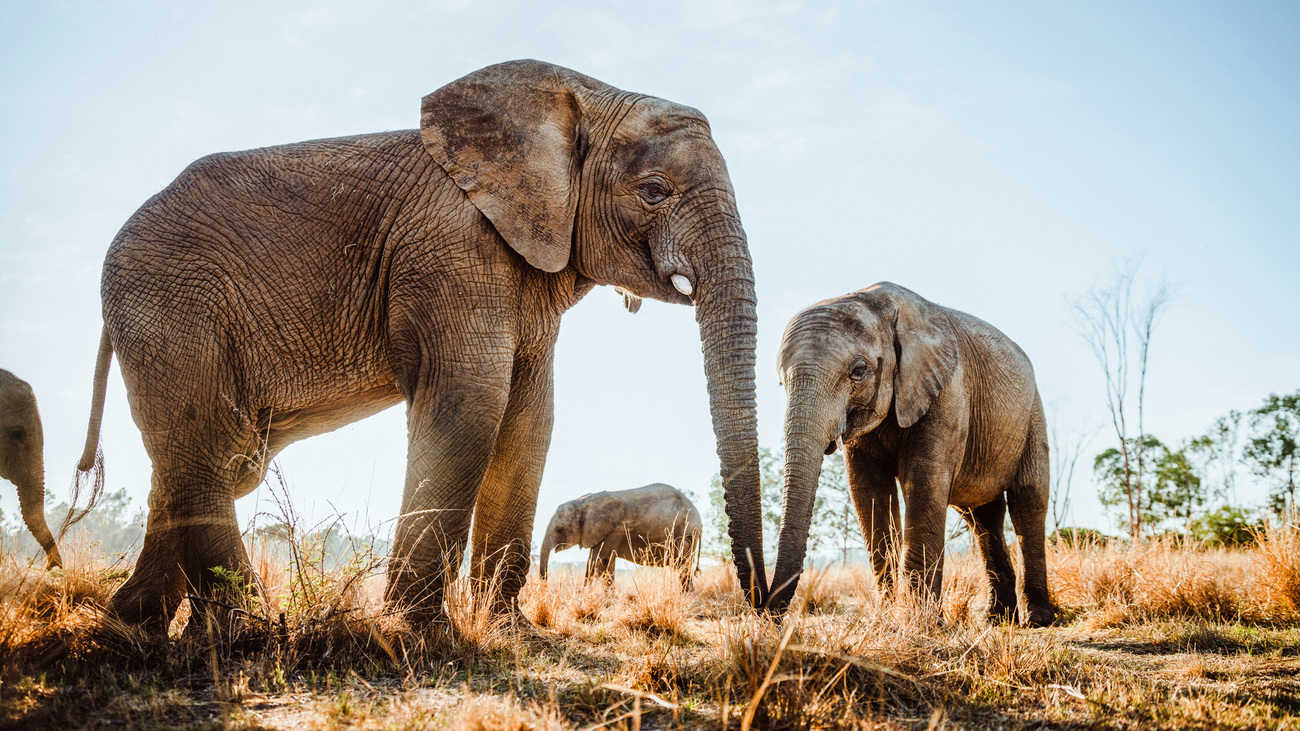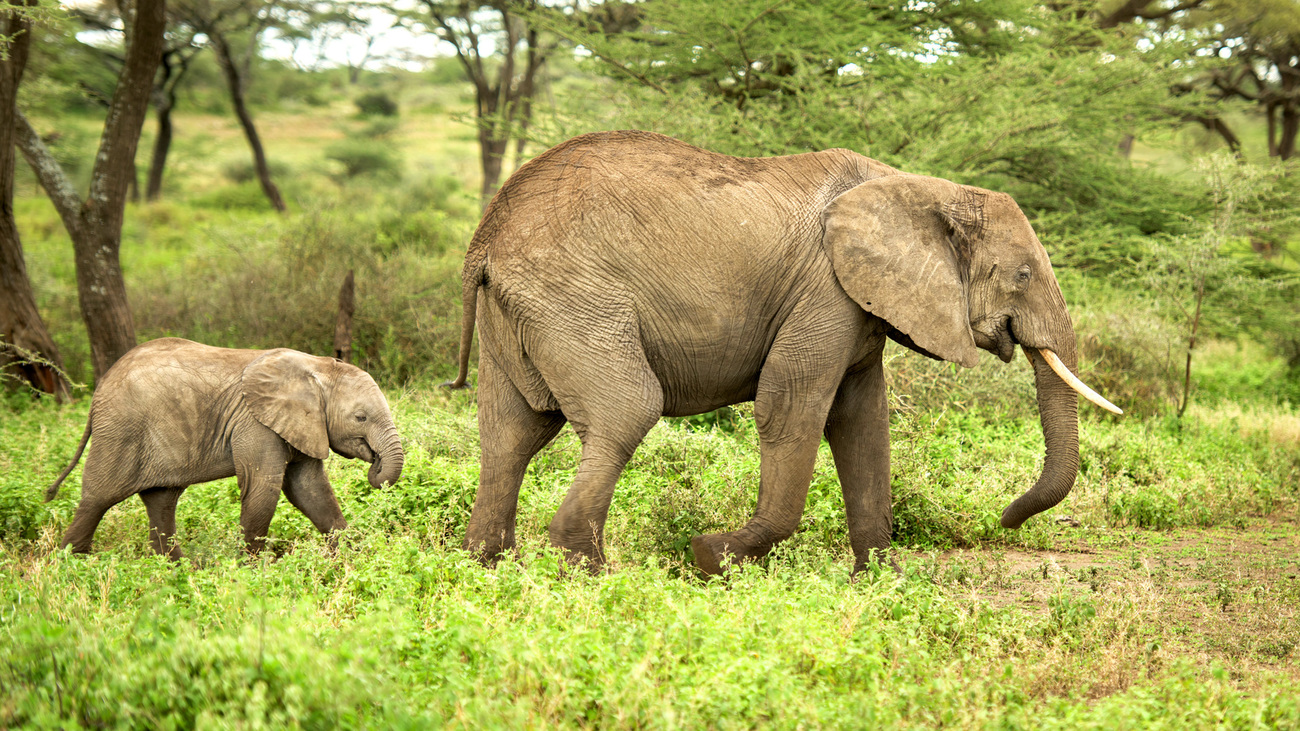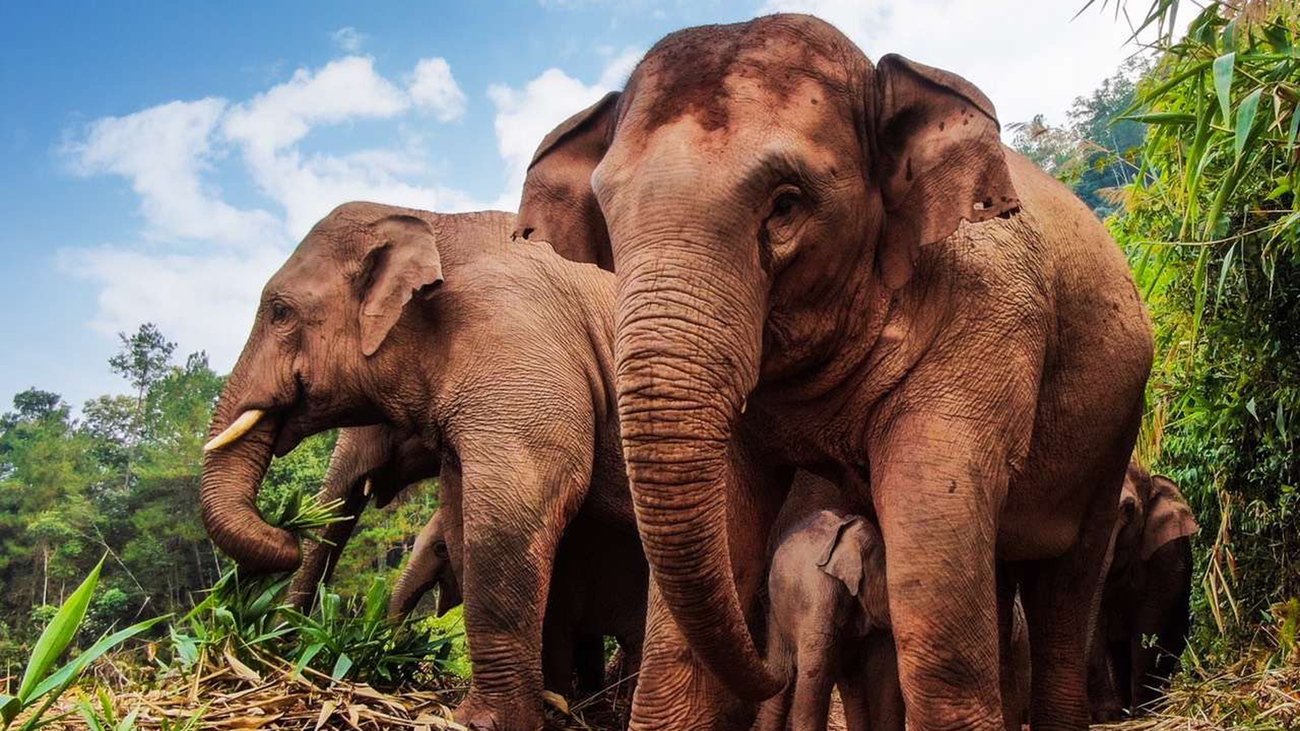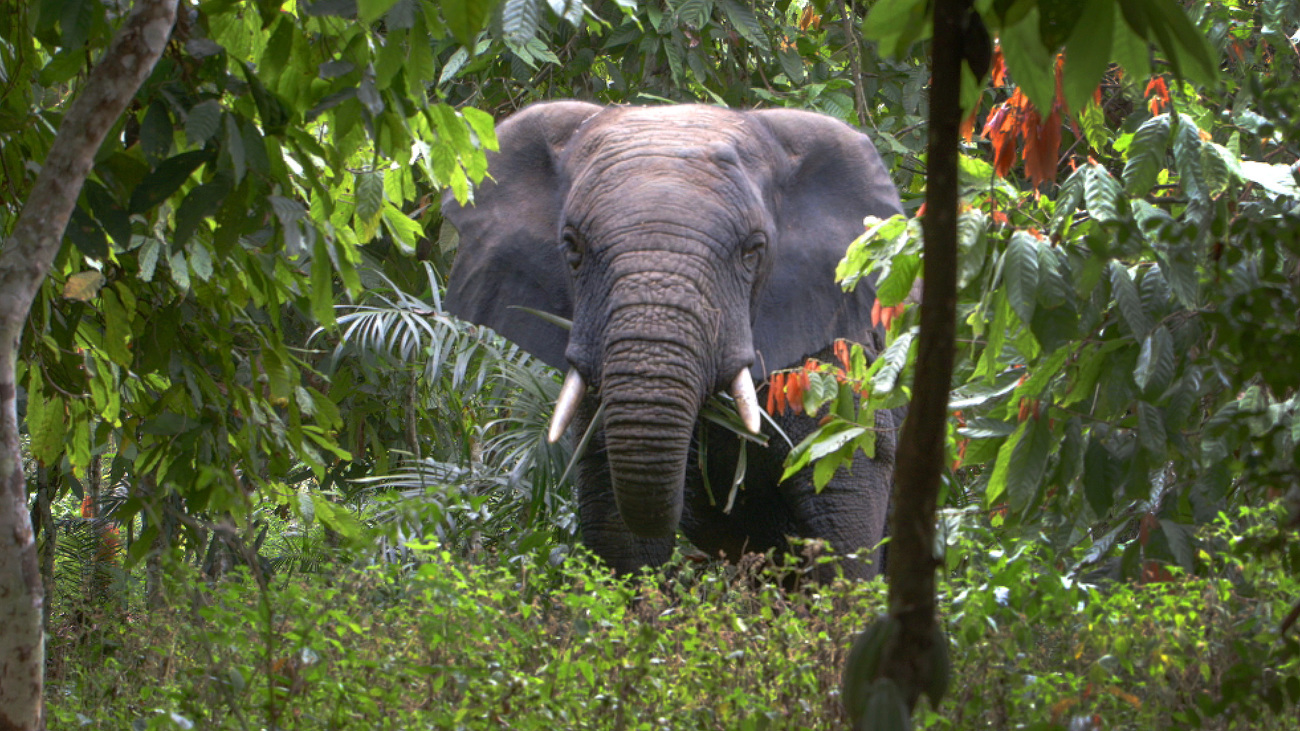Protecting the welfare of elephant populations - Kenya
Partnering with the Kenya Wildlife Service to protect wildlifeElephant facts and statistics
Elephant facts and statistics
Elephants are some of the most endangered animals on our planet, and they’re crucial to our work here at IFAW. Here are some facts and statistics about elephants that might surprise you. Our Room to Roam initiative aims to protect elephants in Africa by reconnecting fragmented habitats and helping to stabilise wild populations. We also support rangers, combat poaching, implement solutions to human-elephant conflict, and care for orphaned calves through sanctuaries and rescue centres.
By learning more about elephants, you too can spread awareness and help us create a better world for these majestic animals in 2025 and beyond. With that in mind, here are some facts and statistics about elephants that might surprise you.

16 fascinating elephant facts
1. There isn’t just one species of elephant—there are three.
The three elephant species include the African savannah elephant (Loxodonta africana, endangered in 2025), African forest elephant (Loxodonta cyclotis, critically endangered in 2025), and Asian elephant (Elephas maximus, endangered in 2025).
Among the Asian elephants, there are at least three recognised subspecies: the Sri Lankan elephant (Elephas maximus maximus), Indian elephant (Elephas maximus indicus), and Sumatran elephant (Elephas maximus sumatrensis). The Borneo elephant (Elephas maximus borneensis) is another subspecies or population of the Asian elephant, and they are the smallest elephant in the world.
2. Elephants are the world’s largest living land animals.
The only living animals bigger than elephants are whales, with the blue whale (Balaenoptera musculus, endangered in 2025) being the largest.
The largest of the three species of elephants is the African savannah elephant. These elephants are about nine metres (30 feet) long from trunk to tail and four metres (13 feet) tall at their shoulders. Adult males can weigh up to 6,800 kilograms (15,000 pounds).
3. Elephants can live almost as long as humans.
While African elephants have a maximum lifespan of about 74 years, Asian elephants can live to about age 80. The oldest known elephant in the world is thought to be an Asian elephant who lived to age 89 in captivity.

4. Elephants have a strong social structure
Some older female elephants are known as matriarchs and serve as the leaders of elephant herds. The remaining females are referred to as cows. These matriarchs lead the way for the well-being and survival of their families.
The elephant family unit consists of a mother, her immature young, and sometimes sisters, aunts, and grandmothers. Family groups generally range in size from two to more than 20 elephants. In these groups, the oldest female is deemed the matriarch. Male elephants generally form bachelor groups consisting of an older male and several younger bulls.
5. Elephant families are always changing
Elephant families are always changing. While an elephant may begin its morning among a group of 12 to 15 individuals, it may join larger herds around midday, feed with smaller groups in the afternoon, and settle down for the night with only its immediate offspring or parents.
This type of social dynamics is known as a fission-fusion society. It’s not unlike how we as humans go to school or work during the day and then return to our households at night.
6. Baby elephants are called calves
Elephant calves weigh around 200 pounds when they are born and drink over four gallons of milk a day. Male elephants mature and leave their mothers at around 14 years old, at which point they go off to join bachelor groups with other young bulls.
In 2025, IFAW continues to support the care of young elephant calves at the Lusaka Elephant Nursery and Zimbabwe Elephant Nursery. To learn more about elephant calves’ demanding needs and to see them in action, check out our video of a day in the life of an elephant keeper.
7. Not all elephants have tusks
Not all elephants have tusks. It’s not just the case of male elephants having tusks and female elephants lacking tusks, either—while most African elephants, both males and females, have tusks, only some male Asian elephants have tusks. Those who don’t grow them sometimes have very small tusks called ‘tushes’, which are barely visible.
Elephants’ tusks can grow up to one metre (3 feet) long and are used to defend against predators, competition between males, and digging for water and roots. Sadly, though, elephants’ tusks make them prime targets for poachers seeking to supply the ivory trade.

8. Elephants are herbivores and eat over more than 300 types of plants
All elephants’ favourite foods include grasses, roots, fruits, and bark. Some Asian elephants also eat bananas, rice, and sugarcane, from crops cultivated by farmers. African elephants also develop a taste for cultivated crops like maize, citrus, and legumes.
Sadly, when elephants are hungry and go after a farmer’s crops, this makes them targets of retaliatory killings—a form of human-wildlife conflict.
9. Elephants have large appetites
An adult elephant consumes about 100 kilograms (200 pounds) of food in one day. They also need to drink about 100 litres (26 gallons) of water per day. These amounts can double if the individual elephant is particularly hungry or thirsty.
Because of their substantial needs, elephants require a lot of space to find resources—which is becoming a problem as human communities expand. Drought caused by climate change is also making it more difficult for elephants to drink enough water. For more than 20 years, IFAW has worked in East and southern Africa to reconnect fragmented elephant habitats and give them enough room to roam.
10. An elephant’s trunk is multifunctional
An elephant’s trunk is actually its nose—however, it serves purposes other than just smelling.
Though it has no joints or bones, the trunk contains thousands of muscles that allow the elephant to pick up water to drink. They can also use trunks as snorkels when wading in deep water. Additionally, they use their drunks for breathing, trumpeting, and spraying water, affection, and other forms of communication. A trunk is a nose, but it is also like an elephant’s hands.
11. Elephants have poor eyesight, but a great sense of smell and hearing
Elephants can hear frequencies as low as 17 Hz—for comparison, humans can only hear as low as 20 Hz. However, on the high-frequency end, they can only hear up to 12,000 Hz, while humans can hear up to 20,000 Hz.

12. Elephants’ ears are important for regulating their body temperatures
Their large ears hold a number of large blood vessels, and their circulatory systems carry blood from their bodies out to their ears. Since their ears are thin and reach far out, the blood cools down. This cooler blood is then circulated back into the body, cooling the elephant down.
13. Elephants are very intelligent and empathetic animals
They have been known to show compassion, self-awareness, and grief, recognising and responding to other elephants’ pain and sadness. For instance, when a member of a herd is injured, the rest of the herd will walk more slowly to make sure they can keep up. Elephants have also been observed lifting injured and sick individuals with their trunks and tusks and making distress calls. Often, when elephants are distressed, they flap their ears and emit low-frequency sounds. When they do so, another elephant may approach them and comfort them by stroking their trunk.
14. As the saying goes, an elephant never forgets
It is true that elephants have excellent memories. Researchers have observed many elephants returning back to their natural habitats years after being rescued from poachers. They also have a great recollection of other elephants’ faces. Matriarch elephants have especially good memories, as they need to keep track of the social dynamics of their herds.
15. Elephants mourn their dead
Elephants appear to have a way of mourning their dead. When encountering the remains of a deceased elephant, they stop and observe them silently, often smelling and touching the bones with their trunks. They sometimes bury deceased members of their herd in branches.
16. Elephants are scared of bees
Elephants are scared of bees. Despite having thick skin and being much larger than these little insects, elephants are vulnerable in the softer areas of their eyes, mouths, and trunks. When they encounter bees, elephants flap their ears, stir up dust, and make a lot of noise. Swarms of bees can seriously hurt elephants, especially young calves—so they tend to stay far away from hives.
At IFAW, we’re using this to our advantage, installing beehives around village perimeters to protect them from wandering elephants who may trample crops or come too close into contact with humans.
What is IFAW doing to help elephants?
IFAW’s Room to Roam initiative is an ambitious vision for elephant conservation in Africa. We work to reconnect fragmented habitats and provide the space these magnificent animals need for finding food, water, mates, and other necessities. Backed by 20 years of science, fieldwork, and community engagement, Room to Roam will ensure the persistence of viable, stable elephant populations into the future.
At IFAW, we also support wildlife rangers and their welfare. These individuals are fighting for elephants on the front lines, protecting them from poachers who seek their tusks to supply the ivory trade. IFAW also combats poaching in other ways, such as through the Coalition to End Wildlife Trafficking Online.
We’re also working with communities to prevent conflict between humans and elephants as these animals come into closer contact with local towns and villages. Because elephants are scared of bees, we installed beehives around the perimeter of one village in Malawi to keep wandering elephants away, which protects both the animals and the people.
In China, we’ve worked to prevent human-elephant conflict by helping villages transition to more wildlife-friendly crops, such as mangoes. This lessens communities’ reliance on harvesting commodities like rubber, which brought workers deep into the forest—and in dangerous proximity to elephants.
Individual elephants matter for the survival of their species. This is why we’re also supporters of sanctuaries and rescue centres, such as the Lusaka Elephant Nursery and Zimbabwe Elephant Nursery, which care for orphaned elephant calves who have lost or become separated from their families.
Related content
Every problem has a solution, every solution needs support.
The problems we face are urgent, complicated, and resistant to change. Real solutions demand creativity, hard work, and involvement from people like you.